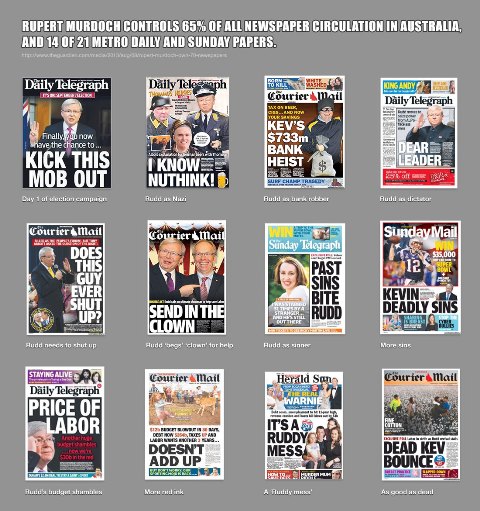words of wisdom? volume four: the news media and “the polls”

Image: The Guardian
The federal election campaign is now officially under way, which means we’ve been plunged headlong into the black hole of empty slogans, tired clichés, insidious euphemisms, half truths, and complete lies. But, hey, at least we’re all in it together.
There’s nothing like an impending election to lower the tone of political language and to muddy the waters of clear and informative discourse (except maybe the Murdoch press, zing!). This column is dedicated to the twists and turns of phrase uttered by politicians on the campaign trail, as viewed through the thick lenses of Toby Newton’s specs.
*
For all the terrible, ignorant, devious, unscripted, or overly-scripted things our pollies say, it would all fall on deaf ears were it not for the ever balanced and honourable reportage of the news media. Of course, no-one’s mind is going to be blown when I point out that the relationship between the media and politicians is uncomfortably close, deeply co-dependent and basically (not to overstate my case) terrible for democracy.
Whether it’s due to the proliferation of the internet and other new media, the diminishing attention spans of younger generations (those damn kids!), or good old-fashioned free-market logic driving a race to the bottom, the quality of political news coverage is dropping fast. The consequences of this superficial engagement with politics are pretty clear. With falling budgets and growing profits at the forefront of media companies’ concerns, the airtime or column inches devoted to serious, considered and contextualised coverage of politics in this country is continuously falling. Politicians are well aware that what gets them noticed is the same that sells papers and TV advertising: short, simple, repeatable slogans that are designed to appeal to the greatest number of people possible. Headlines thus become far more important than policy, and gaffes, missteps, and blunders become the deciding factors in what largely boils down to a popularity contest.
Unfortunately, this becomes somewhat of an irreversible process. As agendas are boiled down to sound bites and shorthand, it becomes harder and harder to push alternative ideas. For instance, because of constant and banal reiteration, refugees = problem to be solved, taxes = drain on business and individuals. These immediate and automatic associations are hard to break except by allowing the time necessary to provide proper context, reasons and evidence for a differing interpretation. It takes far longer and far more explanation to present refugees as something other than a “problem”, than it does to passively accept the engrained assumption reinforced at every turn. As it stands, the news media as a whole doesn’t seem willing to invest the time or money needed to provide alternative views.
Which brings us to polls. God-damned polls. What’s cheaper and easier for television stations and newspapers than to commission a poll of voters and then to write up the results as if it’s news? Correct me if I’m wrong, but surely the job of the news media is to provide information and analysis of the state of affairs in order to facilitate informed and active decision-making by voters. Instead, political coverage has been outsourced to the very public who are, at least in theory, looking to the news media for insight. The polls become the story and so the political discussion is reduced even further to simplistic terms of yes/no, good/bad. This process is most depressingly clear in the commercial television coverage of the recent leaders’ debates, in which the Worm has taken centre stage. Instant feedback from viewers via social media platforms may give a briefly interesting snapshot of voter attitudes, but ultimately it feeds into the same degradation of the political contest into a series of point-scoring opportunities. Rather than examining the content and worth of party policies, news coverage comes down to which individual leader “won”, a decision that is now made by the viewers and then reinforced by commentators who are hardly going to rubbish the opinions of a majority of their audience.
Perhaps the greatest problem with the news media’s reliance on polls was highlighted on Wednesday by Clive Palmer. He revealed that in his former role as a director for the Liberal National Party he bribed polling companies with large donations to procure favourable poll results. Furthermore, two of the most prominent Australian polling companies, Newspoll and Galaxy, are both at least part-owned by Rupert Murdoch’s News Limited. Australia’s atrociously high concentration of media ownership (11 of the 12 capital city daily papers are owned by either News Limited’s News Corporation or Fairfax), combined with Murdoch’s clear intention, reflected in News Corp. papers’ editorial positions, to remove Labor from power mean we should be extremely concerned with the state of political coverage in our media.

